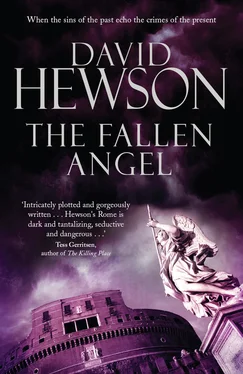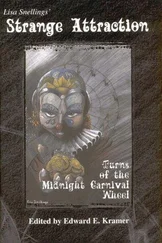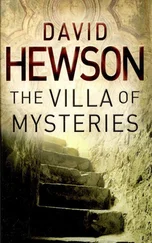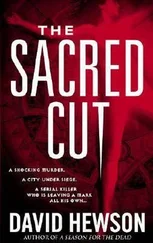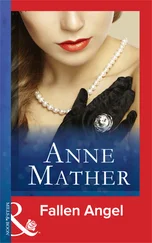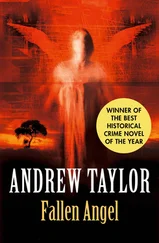David Hewson - The Fallen Angel
Здесь есть возможность читать онлайн «David Hewson - The Fallen Angel» весь текст электронной книги совершенно бесплатно (целиком полную версию без сокращений). В некоторых случаях можно слушать аудио, скачать через торрент в формате fb2 и присутствует краткое содержание. Жанр: Триллер, на английском языке. Описание произведения, (предисловие) а так же отзывы посетителей доступны на портале библиотеки ЛибКат.
- Название:The Fallen Angel
- Автор:
- Жанр:
- Год:неизвестен
- ISBN:нет данных
- Рейтинг книги:5 / 5. Голосов: 1
-
Избранное:Добавить в избранное
- Отзывы:
-
Ваша оценка:
- 100
- 1
- 2
- 3
- 4
- 5
The Fallen Angel: краткое содержание, описание и аннотация
Предлагаем к чтению аннотацию, описание, краткое содержание или предисловие (зависит от того, что написал сам автор книги «The Fallen Angel»). Если вы не нашли необходимую информацию о книге — напишите в комментариях, мы постараемся отыскать её.
The Fallen Angel — читать онлайн бесплатно полную книгу (весь текст) целиком
Ниже представлен текст книги, разбитый по страницам. Система сохранения места последней прочитанной страницы, позволяет с удобством читать онлайн бесплатно книгу «The Fallen Angel», без необходимости каждый раз заново искать на чём Вы остановились. Поставьте закладку, и сможете в любой момент перейти на страницу, на которой закончили чтение.
Интервал:
Закладка:
‘You want your evidence, Nic? Take it. That’s why you came, isn’t it?’
He withdrew his hand, bent down, picked up the cotton shirt from the floor and gave it to her.
‘No,’ he said. ‘It’s the last thing on my mind.’
Out in the garden, among the lilies and the orange trees, beneath the shadow of the tower of the Casina delle Civette, he found himself looking back towards the window, unable to prevent this last backward glance. She stood there, a little hunched, still half-naked, clutching the shirt to her pale skinny chest, watching him leave.
He was too far away to read the expression on her face, and for that Nic Costa was grateful.
FIVE
He rode the rattling turquoise Vespa all the way to Montorio, mostly following the route that the bier of Beatrice Cenci had taken four centuries before. Then he parked outside the church where her remains lay hidden, scattered by time and the cruelty of man.
The place was deserted. The day was still terribly hot. Costa perched on the wall and realized there were two calls he could make. One to the Questura. One to another destination. The first would be irreversible. Perhaps the second too, though in a different, more subtle way.
At least one of these decisions could be postponed. So he phoned and waited until finally there was an answer.
Almost thirty minutes later he saw Agata Graziano walking up the hill below and waved to her from the wall, smiling, his heart full of some inexplicable joy.
She trudged round the long, winding hilly corner and joined him as he sat on the brickwork, looking back at the city the way Mina had once done when they came here.
‘Hello stranger,’ she said, and hitched herself up beside him, letting her legs swing, childlike, over the edge.
‘Am I?’
‘What?’
‘A stranger?’
She was back in old jeans and a T-shirt, hair free and wild, no make-up on her dark, interesting features. There were a couple of crease lines round her eyes. He liked them.
‘Flowers,’ he said, and pulled out from behind the wall the expensive bouquet he’d bought in Trastevere. It was a little battered from the journey up the hill, clutched in his hand as he rode the scooter.
She took them, smelled the fragrant blooms, and smiled.
‘I felt you were a stranger. For a while,’ she said.
‘Sorry. I never meant it that way.’
She watched him with her keen and glittering eyes. Agata had changed again, he thought. Gone was the insular, intransigent sister he’d first met, and the lecturer dressed like one more Roman businesswoman. Perhaps she was finding her real self. It seemed a struggle.
‘It was the girl who got in the way, wasn’t it?’ he asked. ‘Mina. Mina Gabriel?’
She shuffled closer, frowned and toyed with some moss in the brickwork, tugging it out of the cracks.
‘I wish you weren’t so eagle-eyed sometimes,’ she complained.
‘It was a guess.’
‘Really? You still don’t know, do you? I saw you with her. That Monday after her father died. My first day at work. I was in the Piazza Venezia and you two whizzed past on that silly little scooter of yours.’ Agata’s eyes fell to the machine on its stand beneath the trees. She shook her dark head. He watched the way her hair moved, ever more grateful it was unruly, untamed once again. ‘I was so mad. So jealous.’
‘Jealous?’ He laughed, couldn’t help it. ‘She’s seventeen years old.’
‘There she was. Holding onto your waist. Young and beautiful. Free as a bird, riding through Rome as if there was no tomorrow. And me trudging to work, wondering what I’d let myself in for.’
Something had happened. He knew it.
‘Mina was a very troubled young girl. I thought that, perhaps, I could help. Nothing more.’
‘I know. But she was so young. So beautiful. Flying through Rome on a scooter. Holding onto you.’ She turned and stabbed him in the chest with a short, dusky finger. ‘I wanted that to be me . Not her. Not anyone else. Me.’ She looked at him. ‘Perhaps if I hadn’t spent most of my life inside a convent. .’
‘You’re young,’ he said. ‘You’re beautiful.’
She raised a single eyebrow and stared.
‘I mean,’ he insisted quickly, ‘you should never look back. Not like that. There’s nothing there you can change.’
‘I know that. But you can still yearn for something, even if it’s just a dream.’
She kicked her legs against the wall, glanced at him, shrugged her slight shoulders then looked at the view, the forest of spires and great buildings, the distant peaks of the Sabine Hills.
‘I quit the college last week,’ she said. ‘While I was in Milan. At the so-called conference.’
Costa scratched his head and said nothing.
‘It seems,’ Agata added, ‘the job entailed certain duties Bruno had never mentioned at the interview. Bastard. It was like working with an octopus.’
‘Any. . plans?’
She didn’t look at him when she answered.
‘A friend of mine at the Barberini has got me a six-month stint at the Metropolitan Museum in New York. They’ll even pay the air fare and find me somewhere to stay. I’m waiting for the confirmation letter. I should be gone in two weeks. Time enough to get out of Bruno’s little love nest in Governo Vecchio. I wasn’t the first, it seems.’
He didn’t know what to say. Or what to feel either.
‘Why did you phone me?’ Agata asked.
‘I wanted to see you. I wanted to ask your opinion. To tell you a story.’
‘What kind?’ she asked, a little alarmed. ‘Not the usual? You know. .’ She ran a finger across her throat and made a cutting sound. ‘That kind?’
It was the story Mina had told him. About St Peter and Santa Francesca Romana, the church by the Forum, its campanile just out of sight, in its wall a strange stone with what looked like knee marks set in the centre, guarded by iron to save them from the fingers of the curious. He knew that. He’d checked, walking into its cool, dark interior, chatting to the polite and talkative priest he’d found there. It was one of the places on his list for the last few days.
She listened as he told her about the magician called Simon Magus and the saint whose prayers dashed him onto the rocks of the Forum, in front of the Emperor Nero. An act that brought about Peter’s own martyrdom, for murder not faith, on a cross, upside down, no more than a few steps from where they now sat, if the old stories were to be believed.
As he reached that part of the story her eyes travelled to the church and then Bramante’s Tempietto, trapped behind its bars. A steady stream of people, women mainly, were wandering into Montorio. He knew why, and told her. That this was the day of Beatrice Cenci’s death, a day some still marked in sorrowful remembrance.
‘An interesting story,’ Agata said when he was done.
‘I thought so.’
‘And?’
He blinked and asked her what she meant.
‘What is the question you want me to answer?’
‘I’m not sure,’ Costa admitted. ‘Who killed Simon Magus, I imagine? Who stole the old magic from the world? Peter? Or God?’ He tried to find the right words and found they remained as elusive as ever. ‘Who, I suppose, was responsible? In the end?’
‘It’s a fairy-tale, Nic. You shouldn’t read too much into it.’
He thought of the story from the Grimm brothers that Peroni had remembered when they went to see the Turk at Ciampino. Of the bereaved father who fell in love with his own daughter, and pursued her until she gave in.
‘Stories mean something,’ he said. ‘They’re how we express ideas, fears we have that we can’t talk about any other way.’
‘Fairy-tales,’ she repeated, glancing at the door of the church where a group of seven or eight women had arrived in dark dresses, bearing bouquets. ‘Like Beatrice Cenci. A convenient myth around which to build our lives.’
Читать дальшеИнтервал:
Закладка:
Похожие книги на «The Fallen Angel»
Представляем Вашему вниманию похожие книги на «The Fallen Angel» списком для выбора. Мы отобрали схожую по названию и смыслу литературу в надежде предоставить читателям больше вариантов отыскать новые, интересные, ещё непрочитанные произведения.
Обсуждение, отзывы о книге «The Fallen Angel» и просто собственные мнения читателей. Оставьте ваши комментарии, напишите, что Вы думаете о произведении, его смысле или главных героях. Укажите что конкретно понравилось, а что нет, и почему Вы так считаете.
